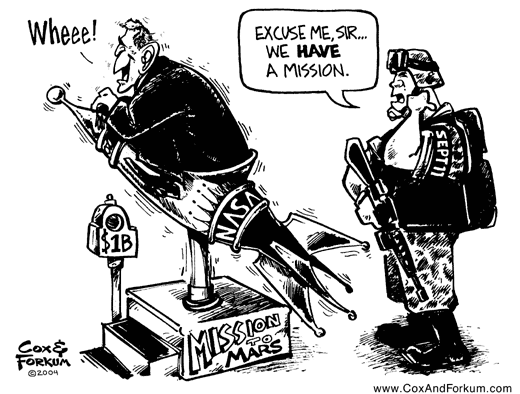Last week, President Bush proposed an extra $1 billion dollars in spending for NASA over the next five years as part of his plan to put a permanent base on the moon and land astronauts on Mars.
In a speech prepared for delivery Wednesday, Bush is calling for a lunar base to be established within two decades and a manned landing on Mars sometime after 2030, an official said. The proposal comes after members of Congress and others have called for a new national vision for the National Aeronautics and Space Administration, urging a human space initiative that would reinvigorate an agency wounded by last year’s loss of space shuttle Columbia and trapped by expensive projects that limit manned spaceflight to low Earth orbit. Bush, speaking with reporters Tuesday on a trip to Mexico, said his plan centers on human exploration of space. “The spirit is going to be one of continued exploration … seeking new horizons and investing in a program that … meets that objective,” he said. His proposal for $1 billion over five years, in effect, would provide startup funds for highly complex projects that could take decades and may require hundreds of billions of additional dollars to complete. [AP]
The space program is funded by tax dollars–the redistribution of wealth from one person to another. While space research is perhaps the least offensive recipient of government funding, the fundamental problem remains: space research has nothing to do with the legitimate function of government. And while it is often argued that the value of technological spin-offs justifies government involvement in space, it must not be forgotten that those spin-offs are the fruit of a poisonous tree.

Cartoon by Cox and Forkum
It’s also interesting that for all the prattling about competition being so important and antitrust being the Magna Charta of free enterprise, few take issue with the government’s monopoly in space. What businessman could hope to compete with the government lifting payloads into space? How high is the regulatory burden placed on vehicles built and launched by private enterprise? Where the justice in a tax-fed government agency deciding what is to be the priority in mankind’s development of space?
But perhaps the cruelest aspect of the government’s involvement in space is the fate of the scientists and engineers who do produce incredible technological achievements. The men and women who make spaceflight possible are heroic. Yet as the Apollo space program showed, when these engineers and scientists achieve all that is asked of them, they will see their budgets slashed and their achievements ignored. I say the work of these heroes ought not to hinge on the political whims of the day.
And today’s space program does look like an exercise in whim worship. What value comes from re-landing men on the moon, or landing men on Mars, when robotic probes can more efficiently carry out the mission? Why do we have a space station that is more a platform for giving idle ex-Soviet space engineers something to do with themselves than a means for engaging in groundbreaking scientific research? Freedom in space–freedom from government funding, control and prioritization–would put the best minds where they would bring the most value, and not subject these minds to the misbegotten whims of their political masters.
The pioneering of space is an incredible achievement of mankind and of the United States in particular. It is said that this renewed interest in space comes off the heels of the Columbia disaster, and is meant to serve as a tribute to their memory. Perhaps, but I say the best tribute to the heroes of space exploration, both living and dead, would be bring to wilds of space the same level of freedom that once made it possible for men to settle the wilds of the American continent.




